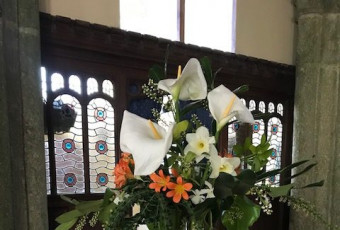A baptism spared me from preaching on Trinity Sunday – but I had been thinking about it so here’s what you missed:
Trinity Sunday 2017
I have been very fortunate that since 2009 that I have preached on Trinity Sunday only on a couple of occasions. One year, I was saved from preaching by having a baptism and I couldn’t possibly speak on such a difficult subject as the Trinity on such an occasion as the baptism of a child. Other years, I have been grateful that I have been the one putting together the rota, as somehow, I managed to produce a rota where I was not preaching… However, today I am preaching on the Trinity knowing that whatever I say will be incomplete and no doubt lacking in many ways as we grapple with the mystery of God in three persons. I take comfort from Augustine of Hippo, one of the Fathers of the Church, who exclaimed, “If you can understand it, it can’t be God.” [quoted by Alistair McGarth in Understanding the Trinity]. Not the most encouraging start to a sermon you may think, so let me lighten the mood.
There aren’t many jokes about the Trinity but I did find this one to help put things in context:
Jesus said, “Whom do men say that I am?”
And his disciples answered and said, “Some say you are John the Baptist returned from the dead; others say Elijah, or some other of the old prophets.”
And Jesus answered and said, “But whom do you say that I am?”
Peter answered and said, “You are the Logos, existing in the Father as His rationality and then, by an act of His will, being generated, in consideration of the various functions by which God is related to his creation, but only on the fact that Scripture speaks of a Father, and a Son, and a Holy Spirit, each member of the Trinity being coequal with every other member, and each acting inseparably with and interpenetrating every other member, with only an economic subordination within God, but causing no division which would make the substance no longer simple.”
And Jesus answering, said, “What?”
Now I don’t want to appear to be anti-intellectual about this – because I firmly believe that God gave us brains not to leave them at the church door, but there is a danger that in the search for definition and understanding of the Trinity such a search can ultimately destroy meaning and may subvert the quest for clarity. So, it can be self-defeating! Doctrine, if you like, is the wineskins that holds the wine. It isn’t the wine itself but it does its best to contain and give shape to the wine. To define the wineskin doesn’t do justice to the wine.
What we know about God is largely known to us by God’s self-revelation. God chooses what is disclosed and that self-disclosure for us is based on what we know about Jesus Christ. Given this, and there are of course many who would argue about that initial assumption, there are a few useful things that I’d like to say about the Trinity. The most important distinction I want to make this morning is this: there is a huge different between knowing about God as some sort of intellectual exercise and knowing God, which is about personal encounter. A personal encounter can neither be proved nor disproved. It must be lived.
First and foremost, for me: God is love in relationship. That love finds expression with a relationship in the Godhead using the language of Father, Son and Holy Spirit. To speak of that relationship is to grasp the essence of God’s self-disclosure to us and points us towards how we should respond to God. But that is just one of many ways in which God is spoken about: We can speak of God as shepherd, as light, as spirit, as rock, as parent – there are numerous ways in which we use language to grapple with an understanding of God.
But sticking with the idea that God is love, then given God’s love we also are driven to respond in love. Jesus gave us that pointer in the commandments to love God, love our neighbour and love ourselves. To live a life following the triune God sounds incredibly simple at one level, but any of us who have lived it know how totally demanding it is when the full implications are taken on board.
We find glimpses of the Trinity in Scripture. Jesus’ baptism gives us one such glimpse with the picture of the voice from heaven, the Spirit hovering like a dove and Christ physically present being baptised in the Jordan. But nowhere will we find a fully worked through theology of the Trinity – Peter’s answer in my joke is never to be found on the lips of any of the disciples and it must be teased out of the scriptures carefully and sensitively. Our forebears spilt blood and ink hammering out what orthodoxy meant in terms of our understanding of the Trinity. For me, we may now have a very good definition of the wineskin, if you like, but we still need to drink of the wine to encounter the living God if we are to know God.
I guess that I am not the only one to have picked up a bottle of wine in the supermarket because I like the look of the label or the shape of the bottle? Perhaps each one of us picks and chooses our doctrinal stances to suit our predispositions as well. We get carried away by the packaging, without thinking too much about the contents. Each of us needs to taste the new wine of the kingdom and realise that packaging is just that – packaging.
The question in my joke: ‘But whom do you say that I am?” is the most pressing question we need to explore in our lives. What do we make of Jesus Christ? We need an encounter with the living God if we are going to have any chance of knowing God as Father, Son and Holy Spirit. Even then we will only have the tip of the iceberg in our understanding of God. Much will remain hidden; much will be beyond our reach.
To describe God as ‘Three in one and one in three’ is much more than a mathematical riddle. It is to do with our experience of the living God in our lives. It is a matter of faith. It is a matter of trust. It is a matter of drinking deeply of the wine of the kingdom and, in my view, not worrying too much about the packaging as John’s Gospel reminded us, “God so loved the world…”
Amen.










